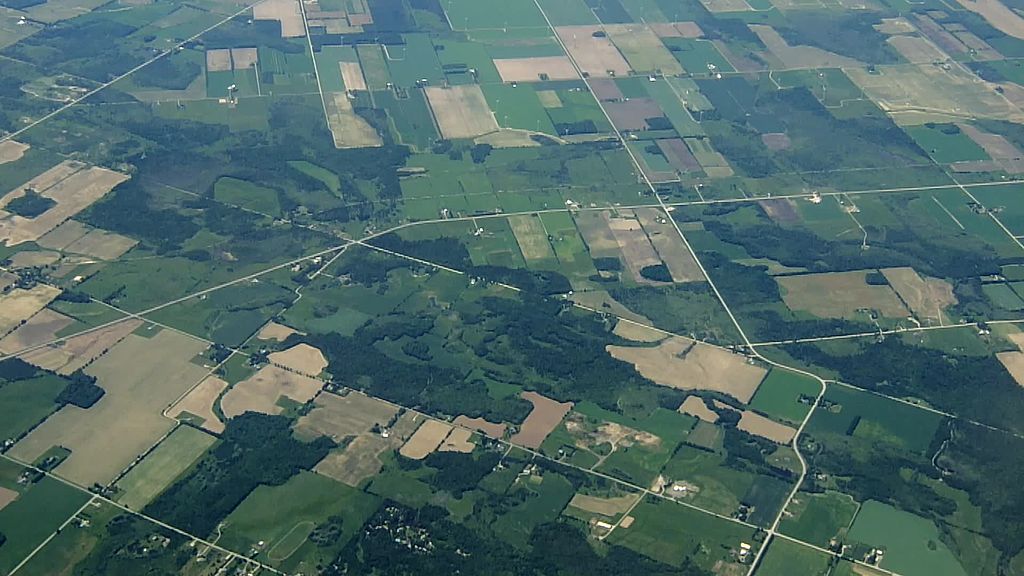Milton resident Margaret Saliba wrote this letter to Halton Region’s councillors with regard to the Preferred Growth Concept, which involves redesignating approximately 5200 acres of Milton and Halton Hills farmland as residential and employment land, as well as densification in other areas of Halton, including parts of Burlington. This plan has been evaluated to be a good compromise between intensification and densification (see “Controversial Halton 2051 Regional Plan Heading Toward Completion“), though groups including Stop Sprawl Halton and Oakvillegreen oppose this plan, instead calling for densification only. They cite food security concerns and that southern Ontario is home to much of Canada’s Class 1 agricultural land, none of which can afford to be lost. Recently, after delegations from Stop Sprawl Halton and other groups, Oakville’s council “unanimously endorsed the criticisms in a staff report that raised concerns about expanding into prime agricultural land” (see the Town of Oakville’s release). But Margaret Saliba presents another perspective, that of a farmer’s daughter. Here is her letter.
“Chair Gary Carr and regional councillors,
Firstly, thank you for all you do for our community.
I am writing this, not from a place of facts I have found on Google,but from a place of being a farmer’s daughter, and now the co-owner of a farm with my two sisters, after the passing of my parents.
There are five farms on the Eighth Line, south of Britannia. We are all in the same position. All farms are now co-owned by siblings. I apologize for the length of this letter, but it comes straight from the heart, in response to the anti-sprawl group [Stop Sprawl Halton], who seem to want to scare people into believing that if these farms go, they will starve. Unfortunately, I do not have stats on how many of these 5000 acres actually grow food for human consumption. But I am guessing very few.
I am seeing all of this “Save our 5000 acres of farmland in Halton.”
I wonder how many of the people promoting this actually live in homes built on land that was once farmland?
Who will continue to farm these farms when this current generation is gone or no longer able to continue the business of farming? The current caretakers of these farms are of retirement age. The next generation has looked at and evaluated the life of a farmer vs. the life of an employee, with its guaranteed income, a 40-hour work week, and benefits [and have chosen the life of an employee]. Quite frankly, I don’t blame them. There are no “young farmers” able to afford to purchase these lands, even at agricultural values, and make a living. The cost of the equipment alone is prohibitive, with some costing as much as a house. It is also known that the yields on these lands are less, and therefore, less cost-effective.
Who today is willing to work 24/7?
Some with livestock, horses, chickens, etc., work 365 days/year, 24/7.
When you consider this, the farmer works for less than minimum wage,and in my opinion, is undervalued and under-appreciated.
Who will work the farm with the farmer? Currently, from what I understand, most of the farm labour has to be imported from Mexico or Jamaica. Our farmers pay for them to come here, give them a place to live, take them to town on at least a weekly basis, pay their medical expenses, etc., and wages. These wages naturally go home with them when the season is over.
How many of “our farms” in this 5000 acres actually grow vegetables and fruit…food for human consumption? How many of these farms are recreational i.e. for horseback riding?
How many people complain about the cost of our produce, not knowing what it takes to grow them? This produce is so dependent on our weather. The farmer grows it, most of it goes to a wholesaler, and then to the stores. How much money do you think the farmer actually makes? My Dad, before his death, would often say that he was getting almost the same amount of money today for his cabbage, etc., as he did when he started farming that property in 1955. Does that make sense to you, as business people?
Why do you want to save “our farmland”? So that you have somewhere to dump your garbage, as opposed to going to the dump, and paying a small fee?
Ontario has lots of arable farmland, currently sitting vacant, that can be used for farms.
I’m tired of hearing this, when as a child growing up on a farm, I was teased and called names because my dad was a farmer. I was then, and I am now,proud that my father and his siblings were all farmers.
I’m tired of hearing today how expensive produce is,how expensive a cauliflower is, with no knowledge of what it takes to grow a white cauliflower. Yet, by the same token, they don’t flinch at the cost of a chocolate bar, or a Starbucks coffee.
I’m tired of hearing how we need to “save these farms,” when one has no idea what it takes to be a farmer who actually grows food for human consumption (not to negate what it takes to grow other crops). These farmers have no idea at the end of the month/year what their salary is. Their salary is so dependent on so many factors. The farmer has no guaranteed income, no five-days-a-week work week, no medical insurance, no vacation, no vacation pay, and NO PENSION.
There is so much more I could say.
I, for one, ask regional council to push forward with the current proposal in front of you [the Preferred Growth Concept]. Countless hours and money have been spent on this. This has been researched and carefully thought out. This group who wants to “stop the sprawl” is currently trying to scare the public into believing that they will starve if these farms are gone. Please don’t let them scare you.
In my humble opinion, if you “save the farmland” it WILL be for naught in the future, when there are no more farmers. The land will stay vacant.
Halton needs these employment lands to ensure employment for its citizens. Consider the employment opportunities, the salaries and benefits one would get from industry vs. farming.
Please do not waste any more taxpayer money than has already been spent on numerous consulting firms, public forums, open houses, and town staff and resources. This plan is well thought-out and has not been an arbitrary decision.
Thank you for reading this, and for your consideration.”
Editor’s Note: we at local-news.ca value all perspectives based on lived experience and/or evidence-based fact. We thank Margaret Saliba for publishing this letter with us and welcome other such perspectives as well.




